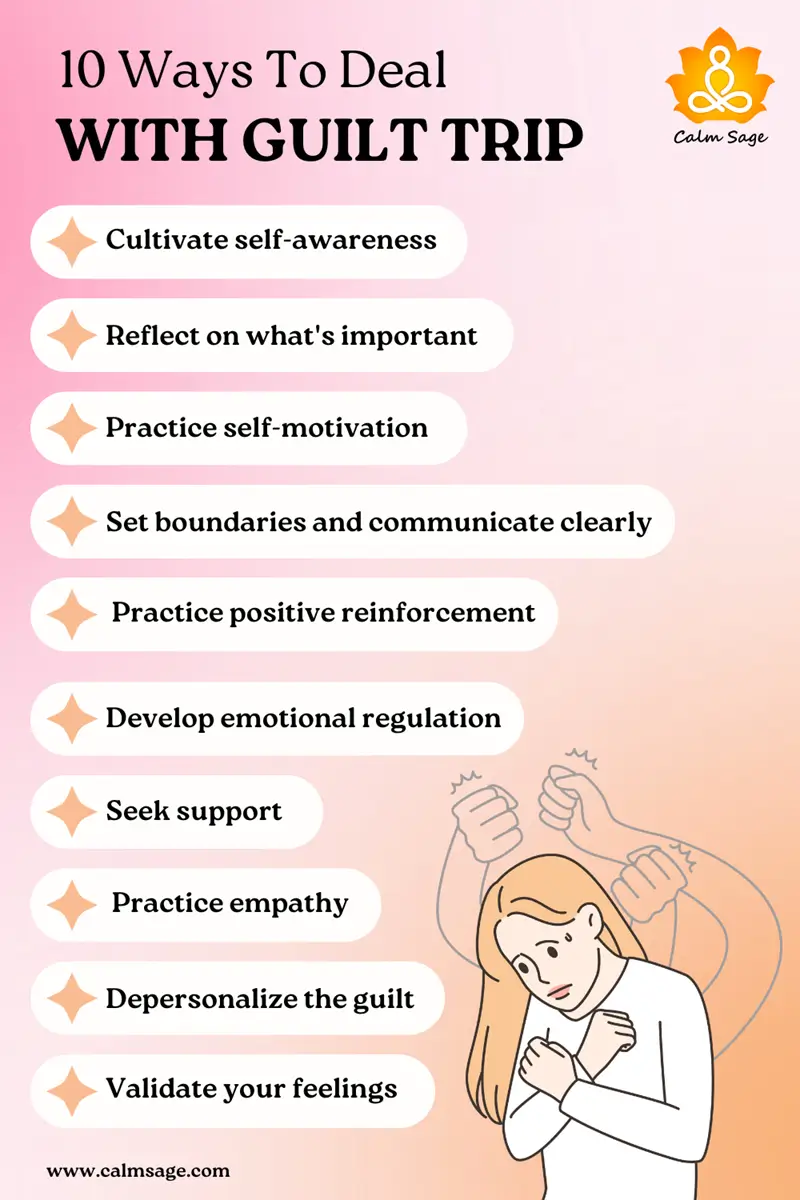Is Guilt Trip Toxic? Learn How To Overcome Guilt Trip

Of course, a guilt trip is toxic. It is so severe that it can impact the mental well-being of an individual. A guilt trip is not exactly your own impression of a negative situation. A guilt trip is also about causing one person to feel guilt about their action or any specific behavior.
Although guilt can be used as a motivational tool to accelerate human behavior sometimes, people use it to manipulate others so that they can get their work done. Once people understand that they can manipulate you to take you on a guilt trip, they can use it as a tool to alter your thinking, feelings, and behavior. Guilt can come from oneself as well, but it can be taken in a positive way to bring optimistic changes in life.
However, when someone else takes you on a guilt trip, they may induce feelings of unjustified responsibility or guilt for manipulating your behavior and emotions.
If you know someone who has done the same with you and manipulated your feelings in such a way, then it is completely toxic and you should work on overcoming such a habit or trait of yours. This blog tells you what guilt trips are, signs of guilt trips, types of guilt trips, the impact of guilt trips on mental wellbeing, and how to cope with them.
So, let’s get started.
Related Read: Grey Rock Method: The New Way of Shutting Toxic People
Signs of Guilt Trip
Guilt trips are both unintentional and intentional; however, they are mostly intentional. There are 90% chances that people will guilt-trip you to get things done in their favor. And such behavior is easily detectable; it’s just all you need to know is the exact traits and signs.
Below are some common signs of guilt trip:
- Making comments against you so that they can manipulate you
- Constantly highlighting mistakes you have done in the past
- The constant reminder of favors they have done for you
- Showing anger in a passive–aggressive manner and then denying it as if they do not have any problem
- Provides you silent treatment so that they can manipulate you to get things done in their way
- Showing anger or manipulating in a tone of voice, body language, and expressions so that they can disapprove or deny whatever you want to do on your own
- A constant reminder that you “owe” them something
- Engagement in passive-aggressive behavior
- Engaging in sarcastic comments so that they can manipulate you to get things done before time and without putting any effort.
Types of Guilt Trip
There are different types of guilt trips that people may use on you to reach their goals or purpose. Some common types of guilt trips are:
1. Conflict avoidance
In some cases, people may try to avoid conflicts with you so that they can do what they want. Their basic communication style is passive aggression.
2. Moral education
By showing you what’s right or by saying out some morals related to their goals and purposes they try to convince you and put you on a guilt trip.
3. Manipulation
Most of the time, the goal or purpose to put you into a guilt trip is to manipulate you. They do it because they want you to do things according to them.
4. Elicit sympathy
By putting you on a guilt trip, if someone gains sympathy from you or others, it is definitely elicit sympathy.
Impact of Guilt Trip on Mental Health
Talking about guilt trips, it has a toxic type of impact on someone’s mental health. Whether it is intentional or unintentional, it brings an individual to the stage wherein he/she tries to prevent communication or connection with others. Some of the other psychological impacts of guilt trips are:
1. Guilt trips damages relationships. When people understand that they have been manipulated or criticized, they try to avoid contact with the specific person and it results in the damage of the relationship.
2. Resentment is the other result of a guilt trip. One of the most leading reasons behind the toxicity of guilt trips is the feelings of resentment.
3. Guilt trips lead to poor mental health. Excessive guilt trips may lead to OCPD, depression, anxiety, and other mental health issues.
How to Deal with Guilt Tripping?
Here’s your mini-guide to deal with guilt-tripping effectively and mindfully:
1. Cultivate self-awareness: Paying attention to toxicity will influence your emotional well-being negatively. Therefore, reflect on what’s important by building self-awareness and enhancing your strengths.
2. Reflect on what’s important: Giving attention to those who need control, attention, or validation will result in more destructive thoughts. Therefore, focus on what’s important and don’t let others control you by controlling your thoughts. Show them your strengths and never let your negative thoughts empower your overall wellbeing.
3. Involve in self-motivation practices: Guilt trippers are manipulators; they exactly know how to demotivate you. By practicing self-motivation strategies, you will be able to indulge more in self-growth, empathy, compassion, and kindness. Change the approach and let the world see the best of you.
4. Set boundaries and clear communication: One of the best ways to deal with guilt-tripping is to set healthy and strict boundaries with people who guilt trips you. Express your needs, state your emotions, and set clear boundaries to strengthen your relationship and emotional well-being.
5. Practice empathy: Empathy is one of the great tools to overcome guilt-tripping. When you start practicing empathy, you enhance self-awareness and you become clearer with your actions.
6. Develop emotional regulation: Emotional regulation skills help you manage and control your emotions in a more practical and healthy way. Emotional regulation skills include mindfulness, meditation, deep breathing exercises, relaxation exercises, and more. they can help you stay grounded and centered in negative situations and moments.
7. Seek support for your loved ones: Changing a habit can be a challenging task, during this period, you can seek the support of your loved ones or a mental health professional. Reaching out to a loved one provides a safe space for changing negative habits and adopting healthier ones.
8. Seek the help of positive reinforcement: Positive reinforcement is the art of using guilt or other negative emotions positively. Positive reinforcement helps in recognizing and appreciating the positive actions in a certain situation and expressing encouragement and gratitude.
9. Depersonalize the guilt: Sometimes, it’s not your fault and in such situations, it’s better to disconnect yourself. Stop personalizing the guilt every time you get stuck in a negative situation, instead build resilience and control your thoughts.
10. Validate your feelings: Showing empathy to the concerned person and validating your feelings can help you reduce the intensity of the guilt trip.

Tips for Overcoming Guilt Trip
There are many ways that can be used to avoid guilt trips, below are some of the effective ways to overcome guilt trips:
- Try to respond with empathy and let them know that you understand everything. Validating your emotions in such cases will help.
- Share your feelings with a closed one or your support system so that they can encourage you to not fall into such traps.
- Setting boundaries with such people help in avoiding guilt-tripping.
Frequently Asked Questions
1. Is guilt-tripping a form of gaslighting?
Guilt-tripping and gaslighting are forms of emotional abuse, but they are two different terms with different meanings. Gaslighting is a pure intention to deny other’s feelings or reality, at the other hand, guilt-tripping induces guilty feelings in people intentionally.
2. Is guilt-tripping a form of abuse?
Guilt tripping is a form of emotional abuse, wherein an abuser induces guilty feelings in the victim to make them feel responsible for all the problems caused in the relationship.
3. Is guilt-tripping toxic?
Yes, guilt-tripping is toxic, it is a form of emotional abuse that is caused by manipulating someone’s emotions to achieve something. It destroys healthy communication, empathy, trust, and respect in a relationship.
4. Is guilt-tripping a red flag?
Frequent guilt-tripping in a relationship can lead to gaslighting, intense toxicity, and distorted well-being, therefore, if your partner is constantly involved in guilt-tripping, it can be a sign of red flag.
5. How to outsmart a guilt tripper?
One of the best ways to outsmart a guilt tripper is to communicate and share your feelings in front of them, avoid playing the blame game, but try to express what you feel and if they acknowledge their issues, set boundaries to establish a healthy relationship.
I hope this blog helps you understand what guilt trips mean and how to overcome them. Comment down and share your experiences after applying these tips. For more such content, connect with us on all social media platforms.
Thanks for reading!




















